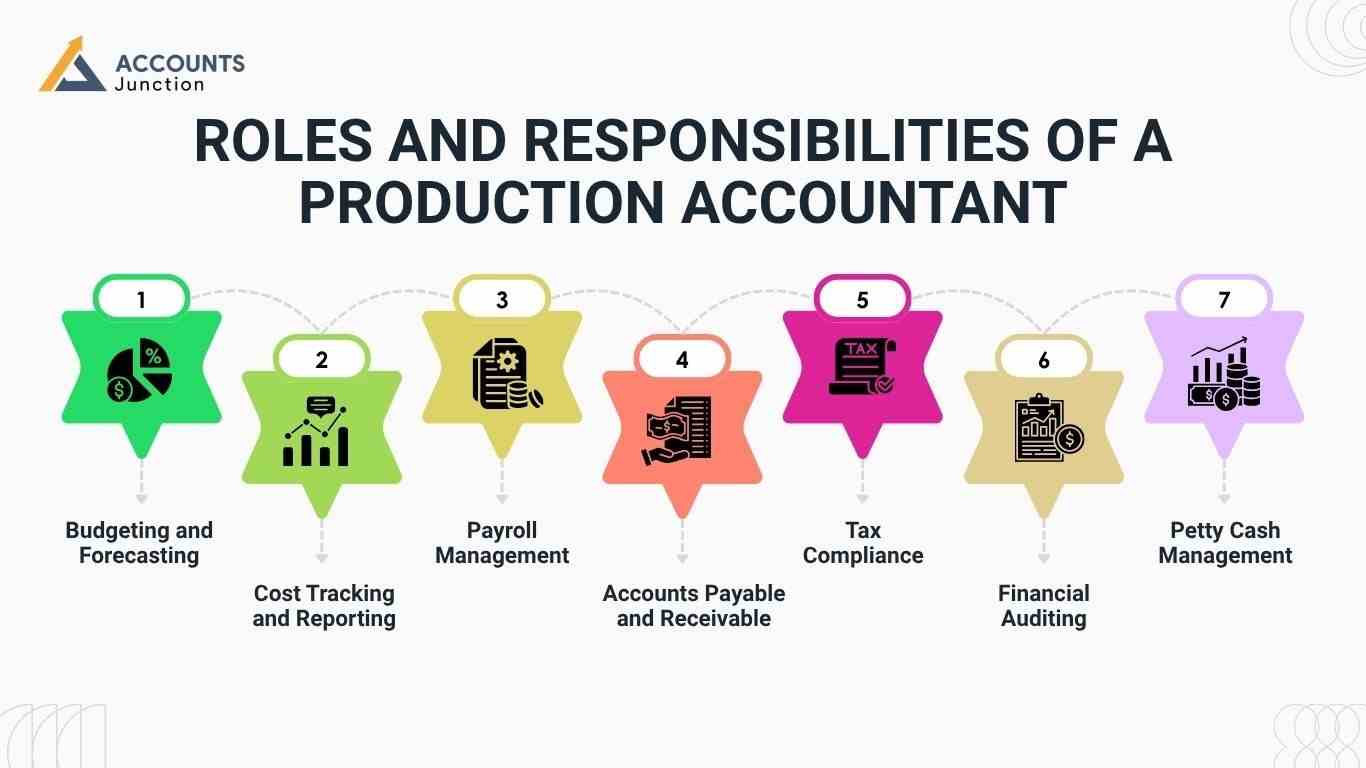
How to Become a Production Accountant
Production accounting is the specialized field of accounting that deals with the financial management of media productions. This includes everything from budgeting and cost tracking to payroll and tax compliance. Unlike traditional accounting, production accounting is highly dynamic, often involving short-term projects with fluctuating budgets and unique expense categories. In this blog, we will share helpful tips on how you can become a production accountant.
Roles and Responsibilities of a Production Accountant
The role of a production accountant is multifaceted and demanding. Here's a glimpse into their key responsibilities, with added detail:
- Budgeting and Forecasting: Creating and managing the production budget, forecasting potential costs, and identifying areas for cost savings. This involves a detailed analysis of script breakdowns, production schedules, and potential contingencies.
- Cost Tracking and Reporting: Accurately tracking all production expenses, generating detailed cost reports, and providing regular financial updates to producers and other stakeholders. This includes managing cost codes, reconciling expenses against budgets, and providing real-time financial updates.
- Payroll Management: Processing payroll for cast and crew, ensuring compliance with labor laws, and managing union requirements. This involves understanding complex union agreements, managing overtime, and ensuring accurate payment schedules.
- Accounts Payable and Receivable: Handling invoices, payments, and reimbursements, and managing accounts receivable. This includes verifying vendor invoices, processing payments, and resolving any discrepancies.
- Tax Compliance: Ensuring compliance with tax regulations, filing necessary tax forms, and managing tax credits and incentives.
- Financial Auditing: Preparing for and assisting with financial audits, ensuring accuracy and transparency in financial records. This involves maintaining accurate documentation and ensuring all financial transactions are properly recorded.
- Petty Cash Management: Managing petty cash accounts, ensuring proper documentation, and reconciling balances. This requires careful tracking of small expenses and ensuring proper approvals.
Skills and Qualifications Needed to Become a Production Accountant
To excel as a production accountant, you'll need a combination of technical skills and personal attributes, with greater emphasis:
- Strong Accounting Knowledge: A solid understanding of accounting principles, financial reporting, and budgeting. This includes knowledge of GAAP (Generally Accepted Accounting Principles) and financial analysis.
- Proficiency in Accounting Software: Familiarity with production accounting software and general accounting software like QuickBooks or SAP. Mastery of these tools is crucial for efficient financial management.
- Excellent Organizational Skills: The ability to manage multiple tasks, prioritize deadlines, and maintain accurate records. Productions are fast-paced, requiring exceptional organization.
- Attention to Detail: A keen eye for detail and accuracy in financial data and calculations.
- Strong Communication Skills: The ability to communicate effectively with producers, crew members, and vendors. This includes explaining complex financial information clearly and concisely.
- Problem-Solving Skills: The ability to identify and resolve financial discrepancies and challenges. Productions often face unexpected financial hurdles.
- Knowledge of the Entertainment Industry: Understanding the unique financial aspects of film, television, or other media productions. This includes familiarity with union agreements, production schedules, and industry terminology.
- Education: A background in accounting, finance, or a similar discipline is frequently favored.Some employers may also value certifications such as a CPA (Certified Public Accountant).

Common Challenges in Production Accounting
Production accounting may look neat on paper, but in real life, it often comes with surprises. Tight budgets, last-minute changes, and unexpected costs can make things tricky.
1. Budget Overruns
- Production costs can rise fast if not watched closely. Delays in filming or sudden equipment needs may throw the budget off track. A good accountant keeps an eye on every change.
2. Complex Payroll Rules
- Managing payroll for a large crew can be confusing. Different pay rates, union rules, and overtime details need constant attention. A single missed detail might delay payments.
3. Tax Credit Complications
- Many productions rely on state or regional tax incentives. While helpful, these incentives often come with strict documentation rules that must be followed to claim benefits.
Steps to Start a Career as a Production Accountant
If you're ready to pursue a career in production accounting, here are some steps to get you started, with added detail:
- Obtain a Relevant Education: Earn a bachelor's degree in accounting, finance, or a related field. To further your expertise, explore advanced degrees or professional credentials.
- Gain Accounting Experience: Work in an entry-level accounting role to gain practical experience and develop your skills. Seek opportunities in industries with similar financial complexities, such as project-based businesses.
- Learn Production Accounting Software: Familiarize yourself with production accounting software and general accounting software. Take online courses, attend workshops, and practice using these tools.
- Network with Industry Professionals: Attend industry events, join professional organizations, and connect with people working in production accounting. Utilize online platforms like LinkedIn to build your network.
- Seek Internship or Entry-Level Opportunities: To gain hands-on experience, look for internships or entry-level positions. These are crucial opportunities in production accounting.
- Build Your Portfolio: Keep track of your projects and accomplishments to showcase your skills and experience. Create a portfolio that highlights your financial management skills and industry knowledge.
- Stay Updated on Industry Trends: Stay updated on production accounting. Follow industry publications and attend workshops. This helps you stay updated with the latest developments. This includes staying updated with changes in tax laws, accounting standards, and technology.
Make sure to carefully plan and analyze the market for better understanding of the profession. Following these steps will help you kickstart your career as a production accountant.
For productions seeking reliable and experienced production accounting services, Accounts Junction offers a comprehensive range of solutions. Our team of skilled professionals has extensive experience in managing the financial aspects of various media productions. We provide accurate and timely financial reporting, ensure compliance with tax regulations, and help productions stay within budget. We understand the unique challenges of the entertainment industry and are committed to providing exceptional service.
FAQs
1. What does a production accountant actually do day to day?
- They may track budgets, handle payroll, process payments, and prepare reports for producers to review.
2. How long does it take to become a production accountant?
- It can take a few years, depending on your education and how fast you gain hands-on experience.
3. Can someone switch from regular accounting to production accounting?
- Yes, with some learning about the industry’s terms, workflows, and software, the transition can be smooth.
4. What software is most used in production accounting?
- Tools like Movie Magic, PSL, and Showbiz are quite common. Some also use QuickBooks for simpler tasks.
5. Do production accountants travel with the film crew?
- Sometimes they do, especially for location shoots, but many work remotely or from production offices.
6. Is production accounting only for movies?
- Not at all. It may include television shows, commercials, web series, and even live events.
7. Can I start in production accounting without a degree?
- It might be possible with enough practical experience and training, though many employers prefer degrees.
8. How stressful is the job of a production accountant?
- It can get intense during shooting schedules or financial audits, but good organization often eases the pressure.
9. Do production accountants deal with taxes directly?
- Yes, they often handle or assist with tax filings, rebates, and incentive claims related to production.
10. What’s the difference between a line producer and a production accountant?
- A line producer oversees the entire budget, while a production accountant manages the actual numbers and reports.
11. How can I get my first production accounting job?
- Try internships, network with film industry professionals, and apply for assistant accountant roles to start.
12. Is it necessary to know union rules?
- Yes, understanding union and guild rules helps manage payroll correctly for cast and crew.
13. What industries outside media hire production accountants?
- Event management, advertising, and creative agencies sometimes need similar project-based accounting skills.
14. Can production accounting software replace accountants?
- Not really. It helps manage data, but accountants still interpret, plan, and make decisions.
15. What’s the biggest mistake new production accountants make?
- Many underestimate how fast expenses add up and forget to update reports daily.
16. Do production accountants work alone or in teams?
- Most work as part of a finance team with assistants, clerks, and coordinators.
17. How much do production accountants earn?
- Pay may vary by project size, location, and experience. Big productions often offer higher rates.
18. Are there courses made just for production accounting?
- Yes, several online platforms and film schools now offer dedicated production accounting courses.
19. What qualities do producers look for in an accountant?
- They value reliability, accuracy, quick thinking, and clear communication.
20. Can freelancers work as production accountants?
- Absolutely. Many accountants prefer freelance or contract-based work, especially in film and TV.
